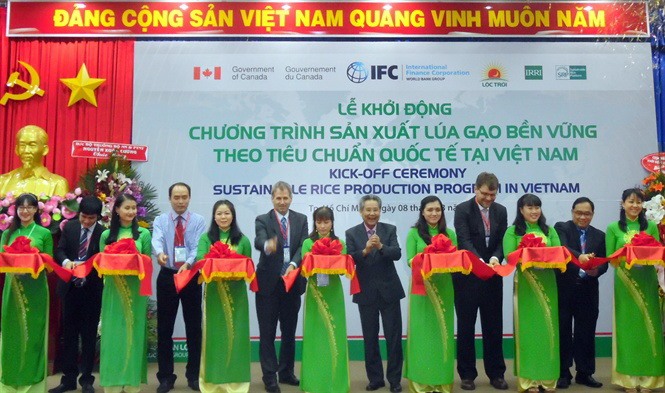 Economy
Economy

Lộc Trời Group, a leading provider of agricultural services and products in Việt Nam, in coordination with IFC and the Sustainable Rice Platform (SRP), launched the Sustainable Rice Production Programme in Việt Nam during a kick-off ceremony held in HCM City on Wednesday.
 |
| IFC, IRRI, SRP and Lộc Trời Group executives inaugurate the Sustainable Rice Production Programme in HCM City on Wednesday. — VNS Photo |
HCM CITY — Lộc Trời Group, a leading provider of agricultural services and products in Việt Nam, inaugurated its Sustainable Rice Production Programme at a ceremony in HCM City on Wednesday where it introduced the project to local stakeholders.
The World Bank’s IFC is helping Lộc Trời roll out sustainable agricultural standards and practices throughout its rice-production value chain in the Mekong Delta.
Improving rice production will help Việt Nam’s agricultural sector expand its global market share and profitability and improve farmers’ livelihoods.
According to reports released at the ceremony, the IFC will work with Lộc Trời over the next two years to help it conform to agricultural standards and practices developed by the Sustainable Rice Platform (SRP), a multi-stakeholder partnership to promote resource efficiency and sustainability both on farm and throughout the rice value chain.
“This new and unique partnership will help provide better returns to shareholders and create brighter futures for farmers,” Huỳnh Văn Thòn, chairman of Lộc Trời Group, said.
“This will be of huge benefit to us as we go about building a specific rice brand with high quality and competitiveness in international markets.”
Some 4,000 farmers will learn about new farming practices that will help them grow high-quality, high-yield grain.
The project will first be piloted and then scaled up.
The IFC is partnering with the International Rice Research Institute, which will provide technical support to Lộc Trời and the farmers in its supply chain.
The group pioneered the building up of the rice-production value-chain models in Việt Nam and has around 25,000 farming households in its fold.
It is looking to manage a sustainable rice supply chain in the Mekong Delta, Việt Nam’s “rice bowl.”
The project is being supported by Canada.
“We are very pleased to support the IFC’s efforts to improve Việt Nam’s agricultural competitiveness while applying climate-smart practices,” Richard Bale, the Canadian consul general in HCM City, said.
“We believe the private sector has an important role to play in promoting sustainable and inclusive economic growth through initiatives such as this one, which will benefit thousands of farmers, both women and men, across the Mekong Delta.”
This new initiative is in line with Việt Nam’s recent ambitious agricultural restructuring plan to enhance the sector’s competitiveness and better position it to respond to international market opportunities.
Despite being a leading rice exporter, Việt Nam faces competition in price and quality from countries such as Thailand, India, Pakistan, Cambodia and Myanmar, according to an IFC’s press release.
“The IFC and the Lộc Trời Group share a common interest in linking up Vietnamese rice farmers to the global supply chain to capture the industry’s full potential,” Kyle Kelhofer, IFC country chief for Việt Nam, Cambodia, and Lao PDR, said.
Established in 1993 and formerly known as An Giang Plant Protection JSC, Lộc Trời Group has been a pioneer in building value chain models for sustainable rice production, focusing on developing and sharing value across the supply chain, especially among farmers. Its engineers have established close links with 25,000 farmers to help reorganise production and provide seeds and agricultural inputs for about 60,000 hectares of large-scale rice fields. — VNS




